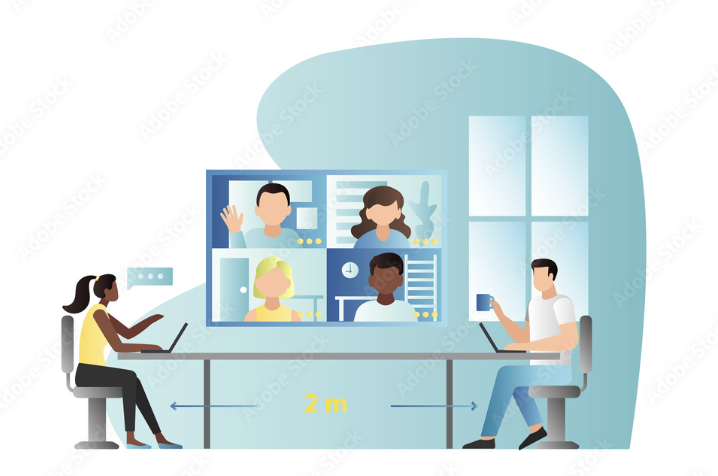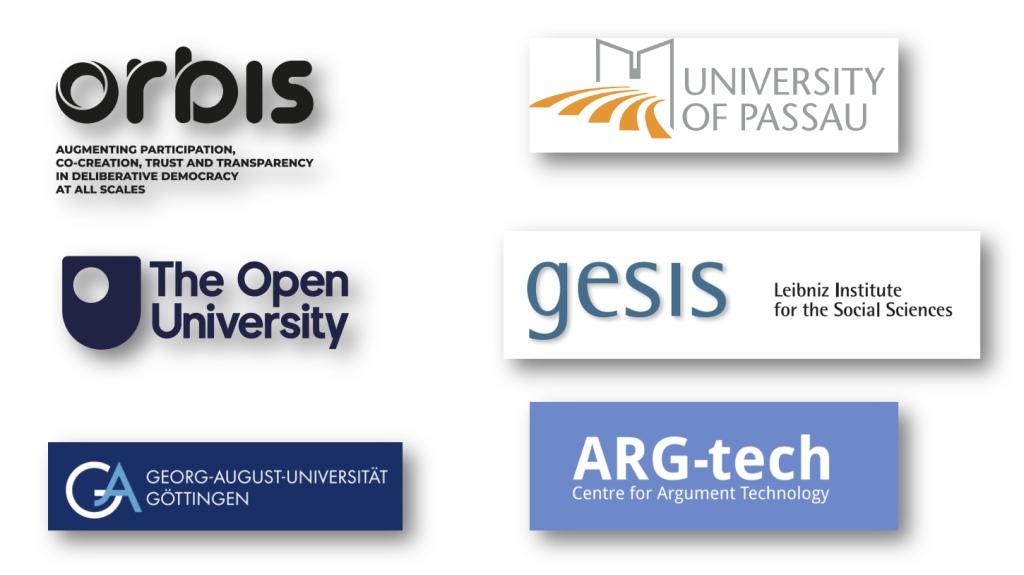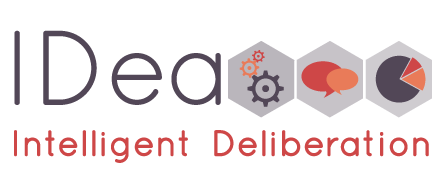
Co-located with LREC-COLING 2024, Torino, Italy
Overview
Deliberation is ubiquitous: from navigating divergent interests in everyday personal life to reaching consensus in the political decision making process, deliberation describes the communicative process by which a group of people exchange ideas, weigh different arguments, and ultimately reach mutual understanding. In recent years, deliberative processes have gained momentum and shown to improve everyday and political decision-making. For the first time, technological solutions are maturing to the point that they can be deployed to support deliberation. In this context, we want to establish the foundations for collecting and curating data for deliberation domains and for evaluating technology in deliberative settings.
The DELITE workshop provides a forum for presenting new advances in technology around deliberation by addressing researchers in Natural Language Processing, human-computer interaction, corpus linguistics, political science and philosophy, as well as stakeholders and domain experts involved in integrating such technology into decision-making processes. The topic is particularly timely given the surge of Large Language Models in the last two years, which has heightened the awareness of the public to the potentials and drawbacks of language technology. On the one hand, LLMs are transforming the way that much AI research is carried out, and certainly in the way that it is understood (and questioned) by the public. But at the same time, it is also becoming clear that handling natural argumentation, particularly the sort of discussion found in deliberative settings, presents deep challenges for LLMs that are not likely to be overcome soon. The complex pragmatic structure of such discussions, nuanced presentation, framing and reframing of ideas, and resolution of differences of opinion all lay many orders of magnitude beyond the current parameterisation spaces of such models. As a consequence, it is likely that neurosymbolic approaches that combine the strengths of new LLM-style language processing with symbolic representations will be a primary means of delivering practical, useful deliberative technology solutions in the medium term.
The gaps facing the nascent field are multifold: there is a scarcity of data on large-scale deliberation, both within and across domains, that can be shared and used to advance experimentation and knowledge in the field. The community also needs requirements from stakeholders and users to inform the design and implementation of technologies and to promote relevant critical questions about the impact of these technologies in real-world contexts. There are no shared tasks for benchmarking systems, which hampers the reliability of evaluation between cases and applications. There is still relatively few platforms available that track, support and improve the decision-making process, and this reduces our ability to assess the impact of deliberation processes and technologies on democratic governance. Finally, there is a dire need of technology that fosters trust by incorporating aspects of explainability and ethical concerns into the design and application of deliberative technologies. This is particularly crucial for the application of such technologies in contexts of democratic innovation, where transparency and accountability are key values of deliberative democracy.
With numerous projects all over Europe interested in aspects of digital democracy, inclusivity and representation in the decision-making process and improving deliberative democracy, DELITE2024 is right at the center of a new interdisciplinary research community, with the language-driven angle representing a fundamental and distinctive contribution.
Topics
Topics for DELITE2024 include, but are not limited to:
- Technological advances for public decision making
- Deliberation theory in NLP models
- In-domain versus across domain resources and corpora
- Data-driven theory development
- Integration of language systems into deliberation processes and interfaces
- Technological solutions for online deliberation at scale
- Argument mining for deliberation scenarios
- Visual Analytics for human sensemaking
- Empirical foundations for evaluation
- Integration and reflection on recent advances in LLMs for deliberation scenarios
- Explainability
- Ethical questions
- Addressing bias
Application areas include, but are not limited to:
- Public policy making
- Democratic innovations
- Deliberative democracy
- Political decision making
- Participatory urban planning
- Citizen engagement and co-creation
- Intelligence services and military
- Conflict resolution/mitigation
- Case analysis in healthcare
- Legal decision making
- Scholarly discourse (written and spoken)
Submissions
Papers must describe original (completed or in progress) and unpublished work. We invite long (8 pages, excluding references) and short papers (4 pages, excluding references). Papers must be anonymized to support double-blind reviewing, i.e., they must not include authors’ names and affiliations and should avoid links to non-anonymized repositories. Papers that do not conform to these requirements will be rejected without review. Upon acceptance, the papers will be given one additional page – for long papers, up to nine (9) pages of content plus unlimited pages for acknowledgments and references and five (5) pages for short papers.
We also invite non-archival, non-anonymous papers (2-4 pages, including references) to describe ongoing work, introduce research projects, or summarize already published work. These will be presented in a poster session where ongoing projects are presented in order to serve community building.
Submission of all papers is electronic, using the Softconf START conference management system (click here to submit). Papers must follow the LREC-COLING 2024 two-column format, using the supplied official style files. The templates can be downloaded from the Style Files and Formatting page provided on the website at the Authors Kit Page. Please do not modify these style files, nor should you use templates designed for other conferences. Submissions that do not conform to the required styles, including paper size, margin width, and font size restrictions, will be rejected without review.
Important Dates
Paper submission deadline: 23 February 2024 March 2nd (Extended)
Notification of acceptance: 27 March 2024
Camera-ready versions due: 5 April 2024
Workshop date: 20 May 2024 (half-day)
SOCIAL DINNER 20.00 @ Trattoria Cantine Barbaroux
Via Giuseppe Barbaroux, 13, 10122 Torino TO
Agenda
Monday 20th May 2024
| Time | Title | Presenter |
|---|---|---|
| 14:00 – 15:00 | Long papers | Gabriella Lapesa Lebniz Institute for the Social Sciences (GESIS), Köln, Heinrich-Heine University Düsseldorf |
| 14:00 – 14:20 | AQuA – Combining Experts’ and Non-Experts’ Views To Assess Deliberation Quality in Online Discussions Using LLMs | Maike Behrendt, Stefan Sylvius Wagner, Marc Ziegele, Lena Wilms, Anke Stoll, Dominique Heinbach and Stefan Harmeling |
| 14:20 – 14:40 | A Unified LLM-KG Framework to Assist Fact-Checking in Public Deliberation | Nikolaos Giarelis, Charalampos Mastrokostas and Nikos Karacapilidis |
| 14:40 – 15:00 | Can Text Simplification Help to Increase the Acceptance of E-participation? | Maike Behrendt, Stefan Sylvius Wagner, Marc Ziegele, Lena Wilms, Anke Stoll, Dominique Heinbach and Stefan Harmeling |
| 15:00 – 15:20 | Short papers | Lucas Anastasiou The Open University |
| 15:00 – 15:05 | Pitfalls of Conversational LLMs on News Debiasing | Ipek Baris Schlicht, Defne Altiok, Maryanne Taouk and Lucie Flek |
| 15:05 – 15:10 | Integrating conflict prevention tools into deliberative democracy online platforms | Sara Greco and Chiara Jermini |
| 15:10 – 15:15 | A Hybrid Human-AI Approach for Argument Map Creation From Transcripts | Lucas Anastasiou and Anna De Liddo |
| 15:15 – 15:20 | Leveraging High-Precision Corpus Queries for Text Classification via Large Language Models | Nathan Dykes, Stephanie Evert, Philipp Heinrich, Merlin Humml and Lutz Schröder |
| 15:20 – 15:40 | Non-archival papers E-DELIB: Powering-up E-Deliberation: Towards AI supported moderation, Gabriella Lapesa, Neele Falk, Iman Jundi and Eva Maria Vecchi From Political Debates to Deliberative Democracy: A Roadmap to Assess Semi-Supervised Argument Mining with DISPUTool, Cristian Cardellino, Elena Cabrio and Serena Villata The iDEM Project: Addressing Linguistic Barriers in Deliberative Processes, Horacio Saggion, Stefan Bott, José L. Martí, Sandra Szasz, Serge Sharoff, Thomas Blanchet, Volkan Sayman, Lian Muñoz, Almudena Rascón, John O’Flaherty, Silvia Sanfilippo and Martin Gollegger CIMT-Dashboard: A Text Classification Tool to Support the Analysis of Public Input in Urban Planning Processes, Julia Romberg, Suzan Padjman and Tobias Escher |
|
| 15:40 – 16:00 | Poster Session | |
| 16:00 – 16:30 | Coffee Break | |
| 16:30 – 17:00 | Poster Session (continued) | |
| 17:00 – 18:00 | Panel | Chair: Chris Reed (ARG-tech, University of Dundee) Panel Participants: Stefano Stortone, Paolo Spada, Julia Romberg, Eleonore Fournier-Tombs and André Bächtiger |
Workshop organizers
Annette Hautli-Janisz (University of Passau)
Gabriella Lapesa (Lebniz Institute for the Social Sciences (GESIS) Köln, Heinrich-Heine (University Düsseldorf)
Valentin Gold (University of Göttingen)
Anna De Liddo (The Open University)
Lucas Anastasiou (Open University)
Chris Reed (University of Dundee)
Program Committee
Miriam Butt (U. Konstanz)
Philipp Cimiano (U. Bielefeld)
Katharina Esau (Queensland U. of Technology)
Neele Falk (U. Stuttgart)
Iman Jundi (U. Stuttgart)
Zlata Kikteva (U. Passau)
John Lawrence (U. Dundee)
Marcin Lewinsky (U. Lisbon)
Steve Oswald (U. Fribourg)
Joonsuk Park (U. Richmond)
Brian Plüss (U. Dundee)
Julia Romberg (U. Düsseldorf)
Paolo Spada (U. Southampton)
Manfred Stede (U. Potsdam)
Sebastian Stier (GESIS, Köln)
Eva Maria Vecchi (U. Stuttgart)
Jacky Visser (U. Dundee)
Henning Wachsmuth (U. Hannover)
Timon Ziegenbein (U. Hannover)
Contact
delite@fim.uni-passau.de
The “Share your Language Resources (LRs)!” initiative
When submitting a paper from the START page, authors will be asked to provide essential information about resources (in a broad sense, i.e. also technologies, standards, evaluation kits, etc.) that have been used for the work described in the paper or are a new result of your research. Moreover, ELRA encourages all LREC-COLING authors to share the described LRs (data, tools, services, etc.) to enable their reuse and replicability of experiments (including evaluation ones).
DeepAI prompt
Deliberation technology tracks the exchange of ideas, the weighing of different arguments and helps to reach mutual consensus.
Sponsors and Partners


